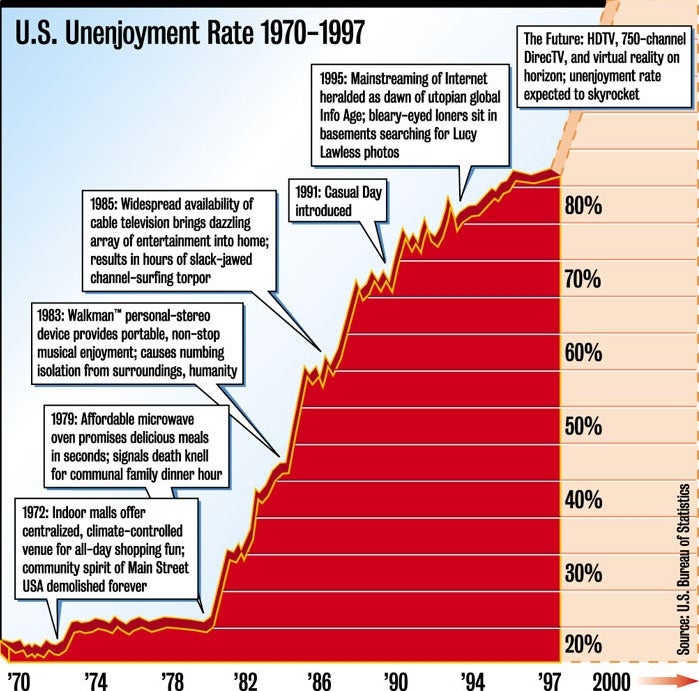WASHINGTON, DC—Despite America’s high standard of living, nearly limitless personal convenience, and undisputed status as the most entertained nation on Earth, the national unenjoyment rate soared to a record 82.2 percent in 1997, according to a report released Monday by the U.S. Bureau of Statistics.

The new figures officially extend a three-decade upward trend for the U.S. unenjoyment rate, which has been on the rise since October 1968.
Said Bureau of Statistics director Janet Penn-Warren: “Despite the innumerable home-entertainment, recreational-shopping and snack-treat options available to Americans; despite the continued expansion of the film, television, music and anti-depressant-drug industries; and despite the ever-growing amount of disposable income and leisure time available to the middle class, the fact remains that Americans are enjoying their lives less than at any point in our nation’s history.”
The federal report, which measures unenjoyment rates by examining a wide variety of hedonistic indicators, found that boredom, jaded detachment, and “a general, creepy sense of ennui” all made unprecedented gains in 1997, as did the National Vague-Sense-That-Everything-Is-Bullshit Index, which rose more than 35 points.
“We have not had a major war since 1975, our personal civil liberties are unrivaled in the world, and we as a nation have more material wealth than any other in history,” Penn-Warren said. “But despite all this, the American people have never been more unhappy and dissatisfied than they are today.”
The new unenjoyment figures met with calls for action on Capitol Hill.
“The pursuit of happiness is a founding principle of this nation,” said House Immediate-Gratification Ways And Means Subcommittee member Sen. Christopher Dodd (D-CT). “If the American people are not feeling happy and entertained, it is our duty as their elected officials to help them, be it by working with top Hollywood producers to make our nation’s computer-generated special effects more eye-popping, by developing even more thrilling games for our Nintendo and Sony PlayStation home-videogame systems, or by providing cable-television subsidies to those Americans who are currently forced to do without.”
Dodd is co-sponsor of the Mandatory Comfort Act, a new personal-satisfaction bill that would guarantee comprehensive unenjoyment benefits to more than 200 million insufficiently diverted Americans. Among the benefits: movie-theater “gift-pak” subsidies, annual distribution of The NBA’s Most Spectacular Dunks videotapes, and the addition of supplemental sugars to all foodstuffs.
While the proposal is said to enjoy strong support in Congress, some observers claim that such a measure would only make matters worse.
“We must ask ourselves why people who face less adversity than any previous generation are so unable to enjoy life,” said Mary K. Dewitt, director of the Los Angeles-based National Enjoyment Institute. “As a society, we are free of almost every major impediment to happiness that has plagued mankind through the ages. Nonetheless, we sleepwalk through each day in a numb, emotionally deadened state of joyless catatonia. Why?”
According to Dewitt, the answer may lie in our society’s steadily rising entertainment expectations. As the level of entertainment to which people become accustomed rises, so too, she contends, does the level of entertainment necessary to make people feel amused, a phenomenon that some have termed “enterflation.”
“The easier our lives become, the harder it is for our entertainment to entertain us, creating a vicious enterflationary cycle that has produced the skyrocketing unenjoyment rates of the past 50 years,” Dewitt said. “What was an incredibly thrilling experience to a 10-year-old in 1950—using a decoder ring, for example, to unscramble an Ovaltine commercial during the Tom Corbett Space-Cadet Radio Hour—would leave a 10-year-old of 1998 feeling profoundly empty inside.”
Continued Dewitt: “Examples of this diminishing-returns curve abound. An actress with the body of Marilyn Monroe couldn’t even get a job cocktail-waitressing in Hollywood today, let alone be enshrined for eternity as the sexiest woman who ever lived. The average cereal commercial on Saturday-morning TV today has as much sensory stimuli in 30 seconds as a 1967 acid-rock freakout had in five hours. It makes my head spin just thinking about it.”
Dr. George Hammond of the American Dissatisfaction Research Group agreed with Dewitt. “If the American people want to retain what precious little is left of their ability to experience pleasure, we must curb enterflation now, through a combination of federally enforced per-capita fun limits and massive, broad-based reductions in U.S. recreation.”
While such radical views are beginning to gain some acceptance, a vast majority of lawmakers and dissatisfied Americans still believe that the solution to the country’s unenjoyment woes is to create more fun now.
“If people want fun now rather than possible increased life-enjoyment in the long run, then those of us in the entertainment industry who wish to stay competitive are simply going to have to give it to them,” said David Foster Wallace, co-creator of the hit NBC sitcom Hey, Man! “It’s a matter of supply and demand, and that’s what America is all about.”







